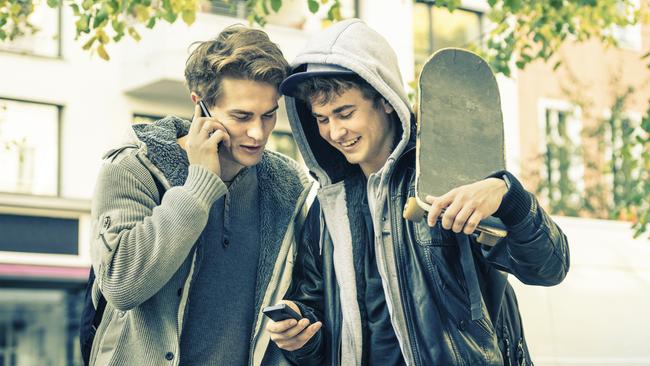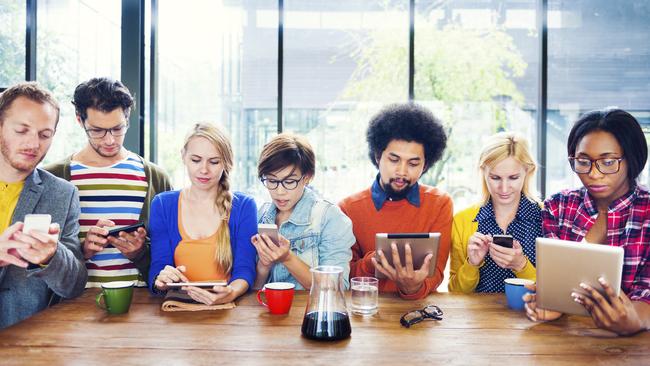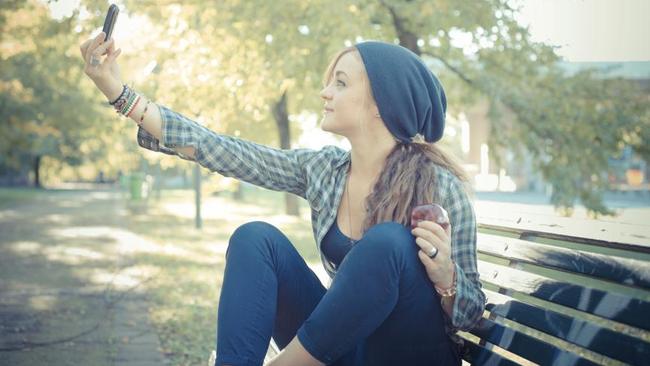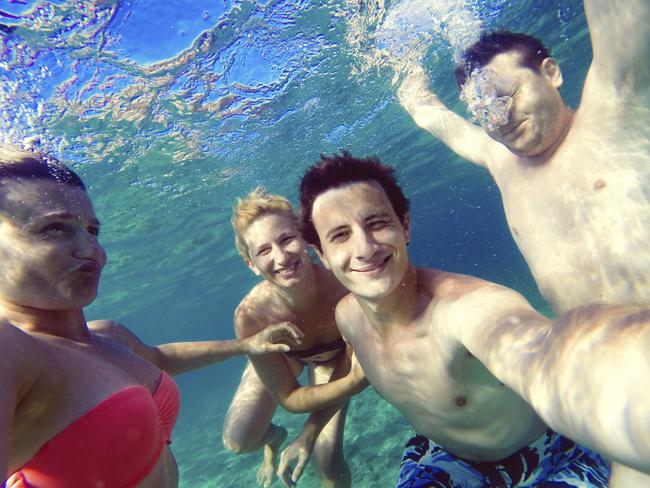What social media is doing to our kids and how to turn back the tide of insecurities
IN AN age where every move our children make is ‘liked’ and shared online, are we raising a generation of people riddled with self-doubt?

BETWEEN Facebook, Instagram, Twitter, Snapchat, Whatsapp, Vine, Tumbler and YouTube, our children have never been so connected.
Nor, according to the following statistics, have they been so self-involved.
Today, for example, your child will log on to Facebook and join the other 986 million daily active users ‘‘liking’’ and commenting on others’ lives or laying theirs bare for critique.
He or she will upload the five selfies taken on the Westfield escalators this afternoon, putting Google’s daily selfie estimate at a total of 93 million and five.
Your child will browse feeds such as the wildly popular Rich Kids of Instagram, which has now become the top photography site of choice for 12-year-olds (despite the 13+ age restriction).
And in a world where seeing is believing, this week alone your child will lay their eyes upon about 5000 photoshopped images.
The question is, if there are countless studies which show looking at social media feeds of other people’s seemingly perfect lives causes depression in adults, what is this it doing to our children?
A MATTER OF ESTEEM
Earlier this year, researchers revealed the content of a survey that showed 35 per cent of the under-18s were worried about being tagged in unattractive photos, while 27 per cent felt stressed about how they looked in posted images.
A further 22 per cent admitted to feeling down if they felt any of the photos they posted had been overlooked by peers.

The study was titled Children, Teens, Media and Body Image, but it could just as well have been called: ‘‘How social media feeds a child’s innate need for social approval and validates their self-worth through ‘likes’ and comments” — because your child’s activity online is closely linked to their self-esteem, says clinical psychologist Louise Adam (treatyourselfwell.com.au).
“By definition, self-esteem is our global evaluation of ourselves, which is worked out by grading ourselves against other people,” she says.
“While it’s innate, self-esteem is also dangerous because it’s a constant message running through your brain that tells you, ‘I’m OK because I’m doing better than X amount of people I see, but if things take a downward turn I’m going to harshly judge myself until I can get back up’ — hence the anxiety we’re seeing.”
One person who’s felt this appearance-based anxiety first hand is author Elizabeth Kesses, who overcame schoolyard bullying and its associated low self-esteem to write The Ugly Little Girl trilogy (theuglylittlegirl.com).
“Having a selfie commented on or being liked can be a temporary morale booster for your child, but if they discover they’re not popular online or they’re bullied or criticised, just like in the real world, they can feel like a failure and have a difficult time coping,” she says.

And while Kesses maintains there’s no one site that is worse than others, it’s been her experience that the psychology behind taking ‘‘the perfect selfie’’ can be particularly soul-destroying for kids.
“Selfies taken occasionally with friends can be harmless fun, however for many they are taken alone, countless times until they get the perfect shot which is then edited and tweaked until all ‘flaws’ are eradicated,” she says.
“This creates dissatisfaction because not only is the child constantly in critique mode in front of either the camera or the mirror, they spend hours niggling the superficial bad bits rather than celebrating the good bits on the inside.”

PICTURE PERFECT
While the relationship between low self-esteem and negative body image is well documented, to see the effect social media is having on growing bodies we need only look to Fiji, says Adams, referring to a notorious 1990s study that looked at how the recent arrival of television had affected Fiji’s youth.
Prior to its introduction in 1995, body dissatisfaction among children was virtually unheard of, but when the researchers returned in 1998, they were quite shocked by their findings.
“The researchers discovered that in the mere three years since images of popular shows such as Beverly Hills 90210 began beaming into family living rooms, 75 per cent of teens now reported feeling fat, 29 per cent rated highly on a test for eating disorder risk, while 15 per cent of teens admitted to vomiting to control their weight.”

So how is this study relevant to what our children are experiencing in Australia in 2015?
Those figures are based on a country that only had one television channel at the time, so when you think about the enormity of social media today, you’ll understand what our kids are up against.
One person who’s seeing first hand what effects social media is having on both our girls and boys is Christine Morgan, chief executive officer of The Butterfly Foundation (thebutterflyfoundation.org.au), a foundation that represents those who suffer from eating disorders and body image issues.
“Kids are very impressionable and easily influenced by our society’s strong cultural ideals of beauty,” she said.

FINDING A SOLUTION
As tempting as it is to create a bonfire of electronic gadgets, to cut your kids off from social media entirely would like swimming against a tsunami, says Adams.
“Social media is here to stay so the best thing you can do for your child is to teach them how to live with it in harmony.”
To that end, Adams recommends reaching out to organisations that teach children media literacy such as The Butterfly Foundation and SeeMe (seeme.org.au).
“You can work with them to teach kids how to look at images with a cynical eye, and also evaluate how seeing certain things makes them feel,” she says.
Follow what they’re doing online and take an interest in whose feeds they’re following.
If they show an unhealthy interest in ‘‘fitspo’’, ‘‘thinspo’’ or bikini challenge-type things, send a clear message that appearance is not important and cut them off.
Set social media curfews so that they have plenty of free time each day when they are not encumbered by the pressure of their online lives — and also, try to be a good role model yourself.
“If you’re spending hours sitting in front of the mirror fat-shaming yourself, nothing else you say or do is going to matter,” says Kesses. “For your child, you will always be their greatest role model.”

HELPING YOUR CHILD LEARN TO LOVE THEIR BODY
Keen to turn your child’s negative body image into something more positive? The Butterfly Foundation’s Christine Morgan recommends:
â— Asking your child to take time out to focus on her positive qualities, skills and talents.
â— Reminding her to say positive things to herself every day.
â— Helping to silence any negative self-talk as soon as you hear it.
â— Setting positive, health-focused goals together rather than anything weight-loss related.
â— Asking her to focus on appreciating and respecting what bodies can do rather than what they look like.
Originally published as What social media is doing to our kids and how to turn back the tide of insecurities



